Legal System for Business Law - BMP4002 Assessment 1
VerifiedAdded on 2023/06/06
|11
|2786
|467
AI Summary
This report discusses the legal system for business law in the UK, covering classifications of law, sources of law, and the UK law-making process for employment law. It also explains the role of courts in the English Legal System and the meaning of delegated legislation. The report concludes with a discussion of the statutory duties of employers to their employees and wrongful and unfair dismissal actions.
Contribute Materials
Your contribution can guide someone’s learning journey. Share your
documents today.
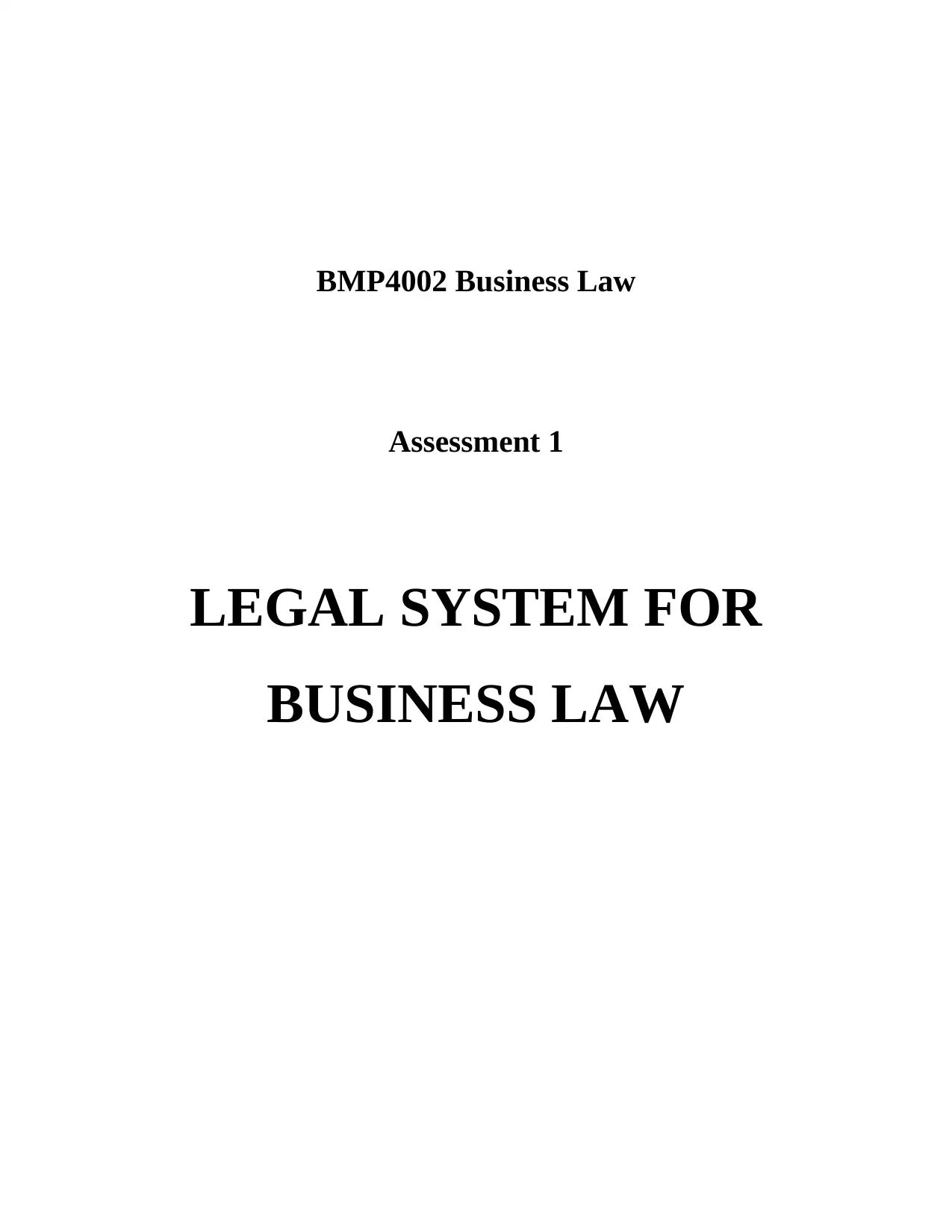
BMP4002 Business Law
Assessment 1
LEGAL SYSTEM FOR
BUSINESS LAW
Assessment 1
LEGAL SYSTEM FOR
BUSINESS LAW
Secure Best Marks with AI Grader
Need help grading? Try our AI Grader for instant feedback on your assignments.
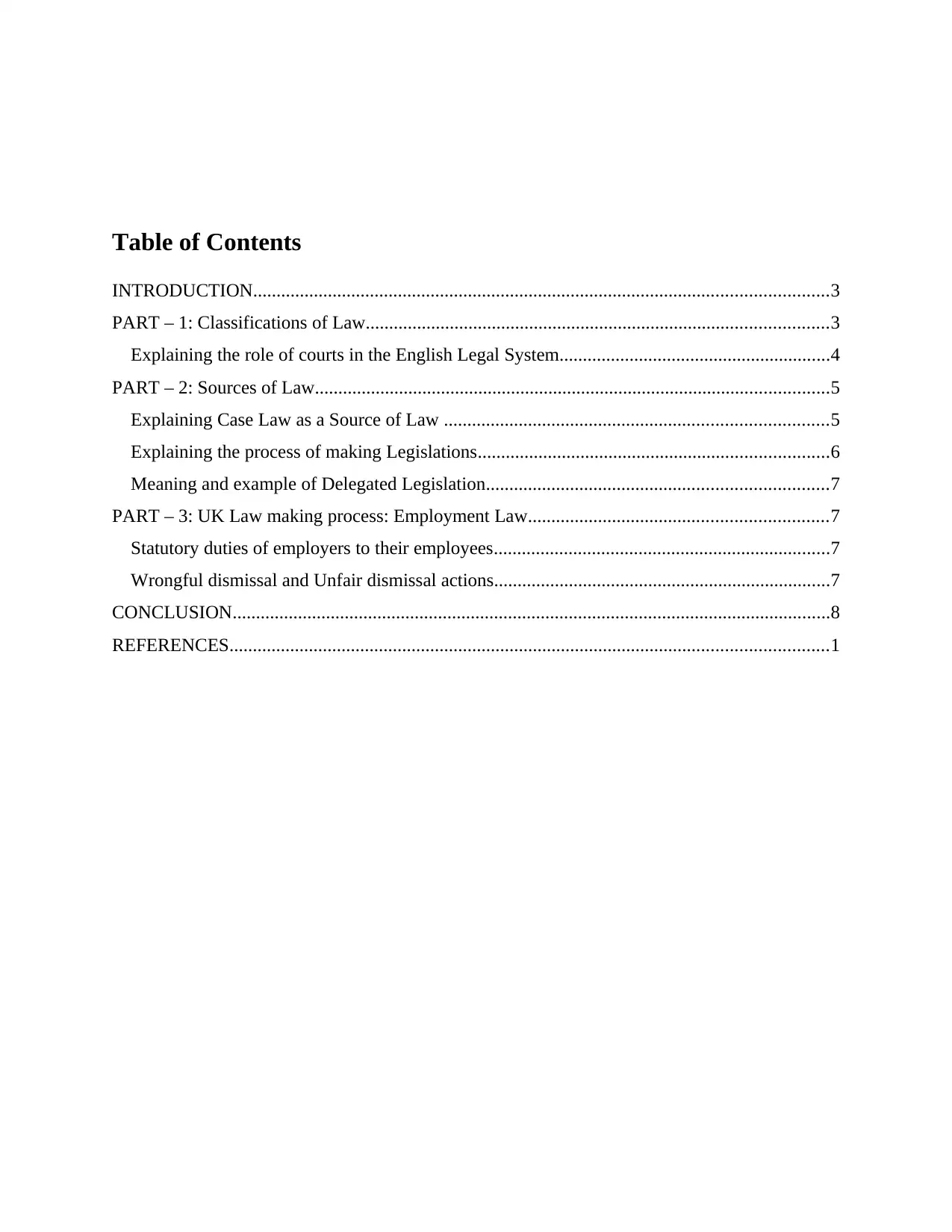
Table of Contents
INTRODUCTION...........................................................................................................................3
PART – 1: Classifications of Law...................................................................................................3
Explaining the role of courts in the English Legal System..........................................................4
PART – 2: Sources of Law..............................................................................................................5
Explaining Case Law as a Source of Law ..................................................................................5
Explaining the process of making Legislations...........................................................................6
Meaning and example of Delegated Legislation.........................................................................7
PART – 3: UK Law making process: Employment Law................................................................7
Statutory duties of employers to their employees........................................................................7
Wrongful dismissal and Unfair dismissal actions........................................................................7
CONCLUSION................................................................................................................................8
REFERENCES................................................................................................................................1
INTRODUCTION...........................................................................................................................3
PART – 1: Classifications of Law...................................................................................................3
Explaining the role of courts in the English Legal System..........................................................4
PART – 2: Sources of Law..............................................................................................................5
Explaining Case Law as a Source of Law ..................................................................................5
Explaining the process of making Legislations...........................................................................6
Meaning and example of Delegated Legislation.........................................................................7
PART – 3: UK Law making process: Employment Law................................................................7
Statutory duties of employers to their employees........................................................................7
Wrongful dismissal and Unfair dismissal actions........................................................................7
CONCLUSION................................................................................................................................8
REFERENCES................................................................................................................................1
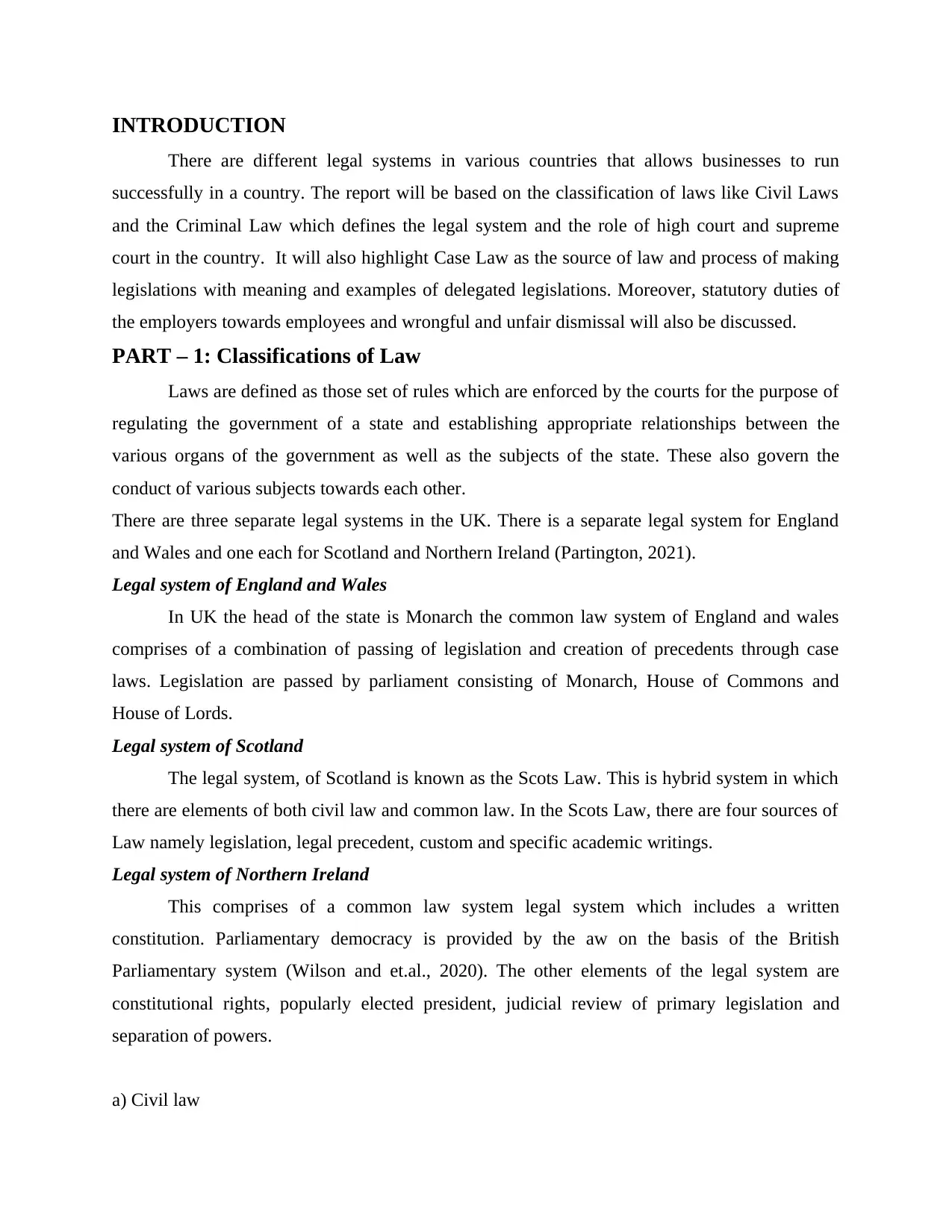
INTRODUCTION
There are different legal systems in various countries that allows businesses to run
successfully in a country. The report will be based on the classification of laws like Civil Laws
and the Criminal Law which defines the legal system and the role of high court and supreme
court in the country. It will also highlight Case Law as the source of law and process of making
legislations with meaning and examples of delegated legislations. Moreover, statutory duties of
the employers towards employees and wrongful and unfair dismissal will also be discussed.
PART – 1: Classifications of Law
Laws are defined as those set of rules which are enforced by the courts for the purpose of
regulating the government of a state and establishing appropriate relationships between the
various organs of the government as well as the subjects of the state. These also govern the
conduct of various subjects towards each other.
There are three separate legal systems in the UK. There is a separate legal system for England
and Wales and one each for Scotland and Northern Ireland (Partington, 2021).
Legal system of England and Wales
In UK the head of the state is Monarch the common law system of England and wales
comprises of a combination of passing of legislation and creation of precedents through case
laws. Legislation are passed by parliament consisting of Monarch, House of Commons and
House of Lords.
Legal system of Scotland
The legal system, of Scotland is known as the Scots Law. This is hybrid system in which
there are elements of both civil law and common law. In the Scots Law, there are four sources of
Law namely legislation, legal precedent, custom and specific academic writings.
Legal system of Northern Ireland
This comprises of a common law system legal system which includes a written
constitution. Parliamentary democracy is provided by the aw on the basis of the British
Parliamentary system (Wilson and et.al., 2020). The other elements of the legal system are
constitutional rights, popularly elected president, judicial review of primary legislation and
separation of powers.
a) Civil law
There are different legal systems in various countries that allows businesses to run
successfully in a country. The report will be based on the classification of laws like Civil Laws
and the Criminal Law which defines the legal system and the role of high court and supreme
court in the country. It will also highlight Case Law as the source of law and process of making
legislations with meaning and examples of delegated legislations. Moreover, statutory duties of
the employers towards employees and wrongful and unfair dismissal will also be discussed.
PART – 1: Classifications of Law
Laws are defined as those set of rules which are enforced by the courts for the purpose of
regulating the government of a state and establishing appropriate relationships between the
various organs of the government as well as the subjects of the state. These also govern the
conduct of various subjects towards each other.
There are three separate legal systems in the UK. There is a separate legal system for England
and Wales and one each for Scotland and Northern Ireland (Partington, 2021).
Legal system of England and Wales
In UK the head of the state is Monarch the common law system of England and wales
comprises of a combination of passing of legislation and creation of precedents through case
laws. Legislation are passed by parliament consisting of Monarch, House of Commons and
House of Lords.
Legal system of Scotland
The legal system, of Scotland is known as the Scots Law. This is hybrid system in which
there are elements of both civil law and common law. In the Scots Law, there are four sources of
Law namely legislation, legal precedent, custom and specific academic writings.
Legal system of Northern Ireland
This comprises of a common law system legal system which includes a written
constitution. Parliamentary democracy is provided by the aw on the basis of the British
Parliamentary system (Wilson and et.al., 2020). The other elements of the legal system are
constitutional rights, popularly elected president, judicial review of primary legislation and
separation of powers.
a) Civil law
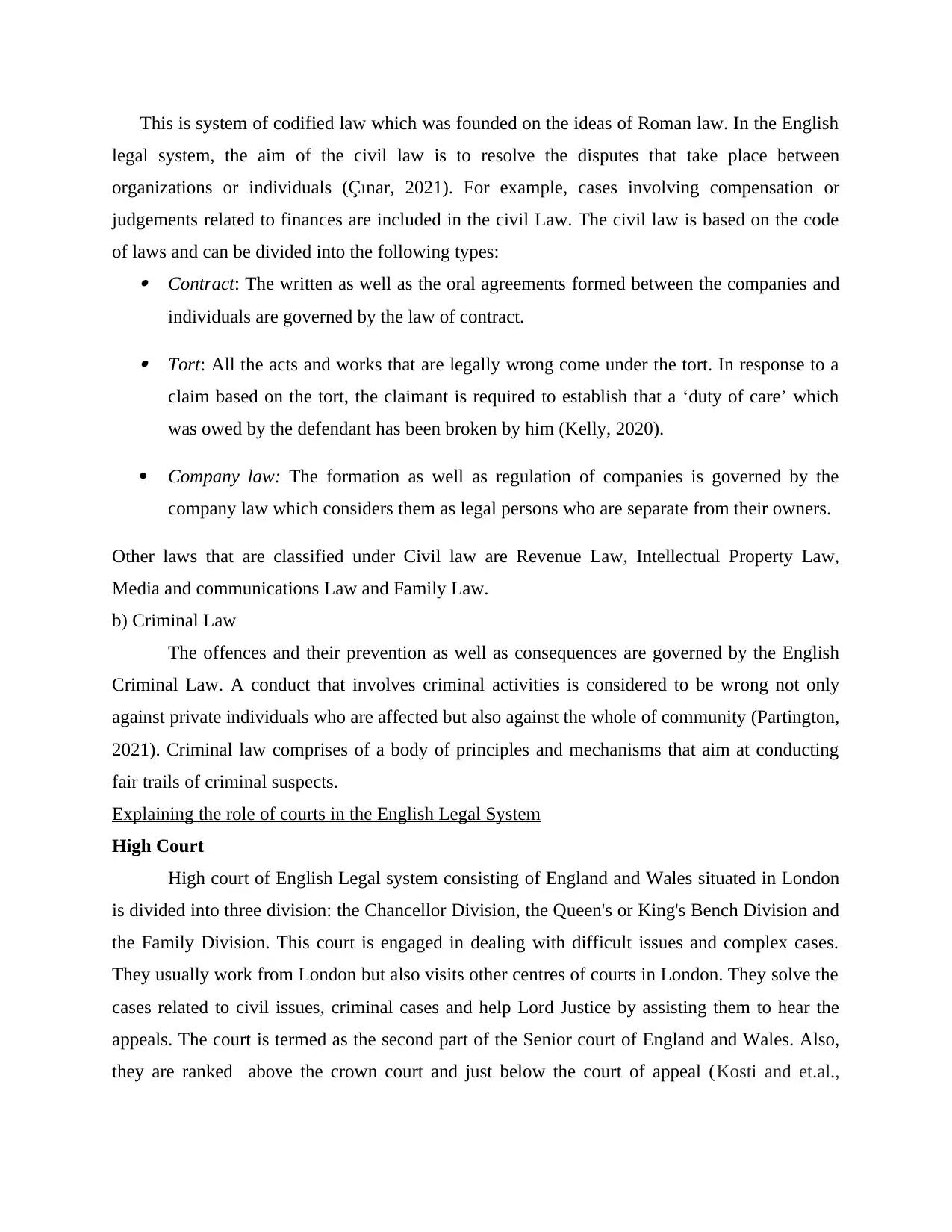
This is system of codified law which was founded on the ideas of Roman law. In the English
legal system, the aim of the civil law is to resolve the disputes that take place between
organizations or individuals (Çınar, 2021). For example, cases involving compensation or
judgements related to finances are included in the civil Law. The civil law is based on the code
of laws and can be divided into the following types: Contract: The written as well as the oral agreements formed between the companies and
individuals are governed by the law of contract.
Tort: All the acts and works that are legally wrong come under the tort. In response to a
claim based on the tort, the claimant is required to establish that a ‘duty of care’ which
was owed by the defendant has been broken by him (Kelly, 2020).
Company law: The formation as well as regulation of companies is governed by the
company law which considers them as legal persons who are separate from their owners.
Other laws that are classified under Civil law are Revenue Law, Intellectual Property Law,
Media and communications Law and Family Law.
b) Criminal Law
The offences and their prevention as well as consequences are governed by the English
Criminal Law. A conduct that involves criminal activities is considered to be wrong not only
against private individuals who are affected but also against the whole of community (Partington,
2021). Criminal law comprises of a body of principles and mechanisms that aim at conducting
fair trails of criminal suspects.
Explaining the role of courts in the English Legal System
High Court
High court of English Legal system consisting of England and Wales situated in London
is divided into three division: the Chancellor Division, the Queen's or King's Bench Division and
the Family Division. This court is engaged in dealing with difficult issues and complex cases.
They usually work from London but also visits other centres of courts in London. They solve the
cases related to civil issues, criminal cases and help Lord Justice by assisting them to hear the
appeals. The court is termed as the second part of the Senior court of England and Wales. Also,
they are ranked above the crown court and just below the court of appeal (Kosti and et.al.,
legal system, the aim of the civil law is to resolve the disputes that take place between
organizations or individuals (Çınar, 2021). For example, cases involving compensation or
judgements related to finances are included in the civil Law. The civil law is based on the code
of laws and can be divided into the following types: Contract: The written as well as the oral agreements formed between the companies and
individuals are governed by the law of contract.
Tort: All the acts and works that are legally wrong come under the tort. In response to a
claim based on the tort, the claimant is required to establish that a ‘duty of care’ which
was owed by the defendant has been broken by him (Kelly, 2020).
Company law: The formation as well as regulation of companies is governed by the
company law which considers them as legal persons who are separate from their owners.
Other laws that are classified under Civil law are Revenue Law, Intellectual Property Law,
Media and communications Law and Family Law.
b) Criminal Law
The offences and their prevention as well as consequences are governed by the English
Criminal Law. A conduct that involves criminal activities is considered to be wrong not only
against private individuals who are affected but also against the whole of community (Partington,
2021). Criminal law comprises of a body of principles and mechanisms that aim at conducting
fair trails of criminal suspects.
Explaining the role of courts in the English Legal System
High Court
High court of English Legal system consisting of England and Wales situated in London
is divided into three division: the Chancellor Division, the Queen's or King's Bench Division and
the Family Division. This court is engaged in dealing with difficult issues and complex cases.
They usually work from London but also visits other centres of courts in London. They solve the
cases related to civil issues, criminal cases and help Lord Justice by assisting them to hear the
appeals. The court is termed as the second part of the Senior court of England and Wales. Also,
they are ranked above the crown court and just below the court of appeal (Kosti and et.al.,
Secure Best Marks with AI Grader
Need help grading? Try our AI Grader for instant feedback on your assignments.
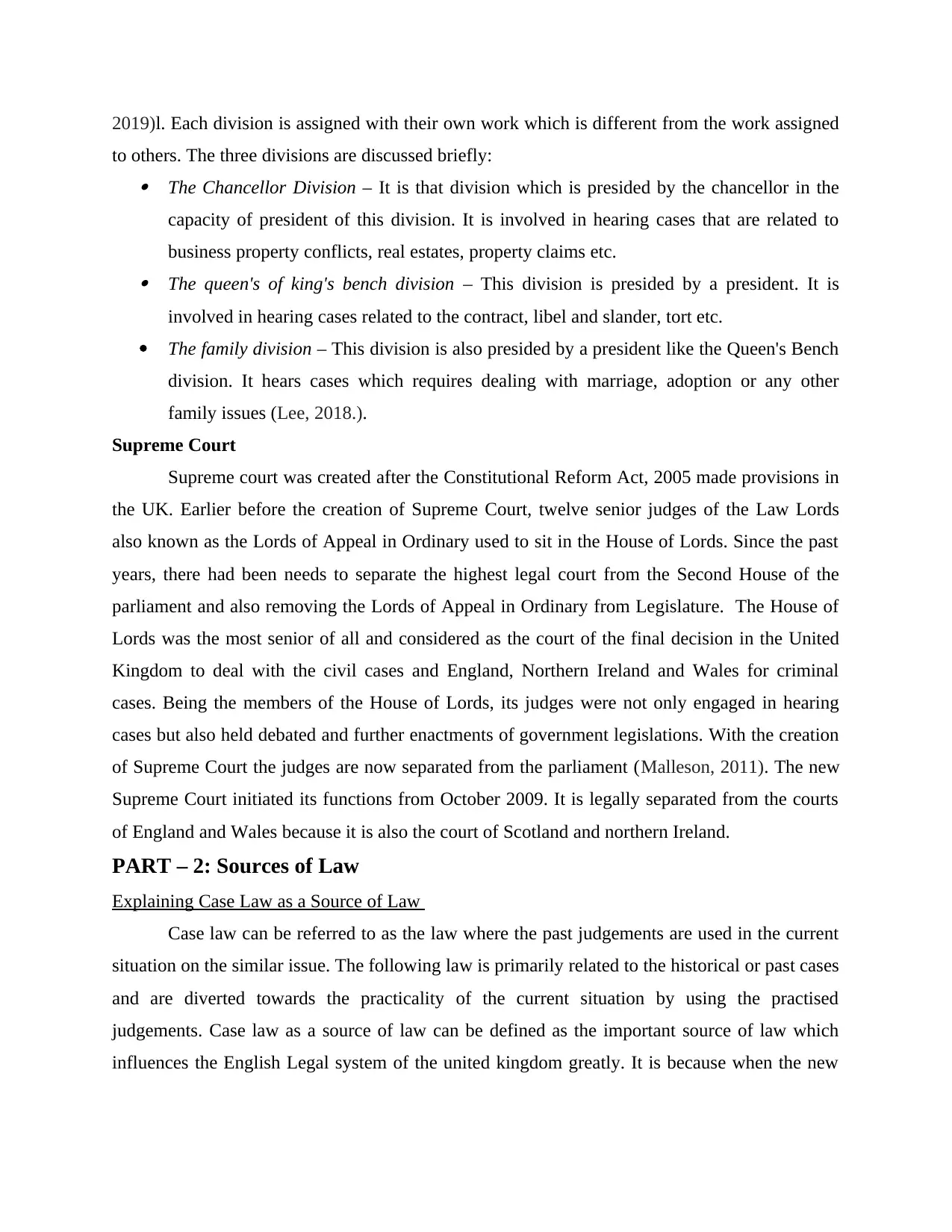
2019)l. Each division is assigned with their own work which is different from the work assigned
to others. The three divisions are discussed briefly: The Chancellor Division – It is that division which is presided by the chancellor in the
capacity of president of this division. It is involved in hearing cases that are related to
business property conflicts, real estates, property claims etc. The queen's of king's bench division – This division is presided by a president. It is
involved in hearing cases related to the contract, libel and slander, tort etc.
The family division – This division is also presided by a president like the Queen's Bench
division. It hears cases which requires dealing with marriage, adoption or any other
family issues (Lee, 2018.).
Supreme Court
Supreme court was created after the Constitutional Reform Act, 2005 made provisions in
the UK. Earlier before the creation of Supreme Court, twelve senior judges of the Law Lords
also known as the Lords of Appeal in Ordinary used to sit in the House of Lords. Since the past
years, there had been needs to separate the highest legal court from the Second House of the
parliament and also removing the Lords of Appeal in Ordinary from Legislature. The House of
Lords was the most senior of all and considered as the court of the final decision in the United
Kingdom to deal with the civil cases and England, Northern Ireland and Wales for criminal
cases. Being the members of the House of Lords, its judges were not only engaged in hearing
cases but also held debated and further enactments of government legislations. With the creation
of Supreme Court the judges are now separated from the parliament (Malleson, 2011). The new
Supreme Court initiated its functions from October 2009. It is legally separated from the courts
of England and Wales because it is also the court of Scotland and northern Ireland.
PART – 2: Sources of Law
Explaining Case Law as a Source of Law
Case law can be referred to as the law where the past judgements are used in the current
situation on the similar issue. The following law is primarily related to the historical or past cases
and are diverted towards the practicality of the current situation by using the practised
judgements. Case law as a source of law can be defined as the important source of law which
influences the English Legal system of the united kingdom greatly. It is because when the new
to others. The three divisions are discussed briefly: The Chancellor Division – It is that division which is presided by the chancellor in the
capacity of president of this division. It is involved in hearing cases that are related to
business property conflicts, real estates, property claims etc. The queen's of king's bench division – This division is presided by a president. It is
involved in hearing cases related to the contract, libel and slander, tort etc.
The family division – This division is also presided by a president like the Queen's Bench
division. It hears cases which requires dealing with marriage, adoption or any other
family issues (Lee, 2018.).
Supreme Court
Supreme court was created after the Constitutional Reform Act, 2005 made provisions in
the UK. Earlier before the creation of Supreme Court, twelve senior judges of the Law Lords
also known as the Lords of Appeal in Ordinary used to sit in the House of Lords. Since the past
years, there had been needs to separate the highest legal court from the Second House of the
parliament and also removing the Lords of Appeal in Ordinary from Legislature. The House of
Lords was the most senior of all and considered as the court of the final decision in the United
Kingdom to deal with the civil cases and England, Northern Ireland and Wales for criminal
cases. Being the members of the House of Lords, its judges were not only engaged in hearing
cases but also held debated and further enactments of government legislations. With the creation
of Supreme Court the judges are now separated from the parliament (Malleson, 2011). The new
Supreme Court initiated its functions from October 2009. It is legally separated from the courts
of England and Wales because it is also the court of Scotland and northern Ireland.
PART – 2: Sources of Law
Explaining Case Law as a Source of Law
Case law can be referred to as the law where the past judgements are used in the current
situation on the similar issue. The following law is primarily related to the historical or past cases
and are diverted towards the practicality of the current situation by using the practised
judgements. Case law as a source of law can be defined as the important source of law which
influences the English Legal system of the united kingdom greatly. It is because when the new
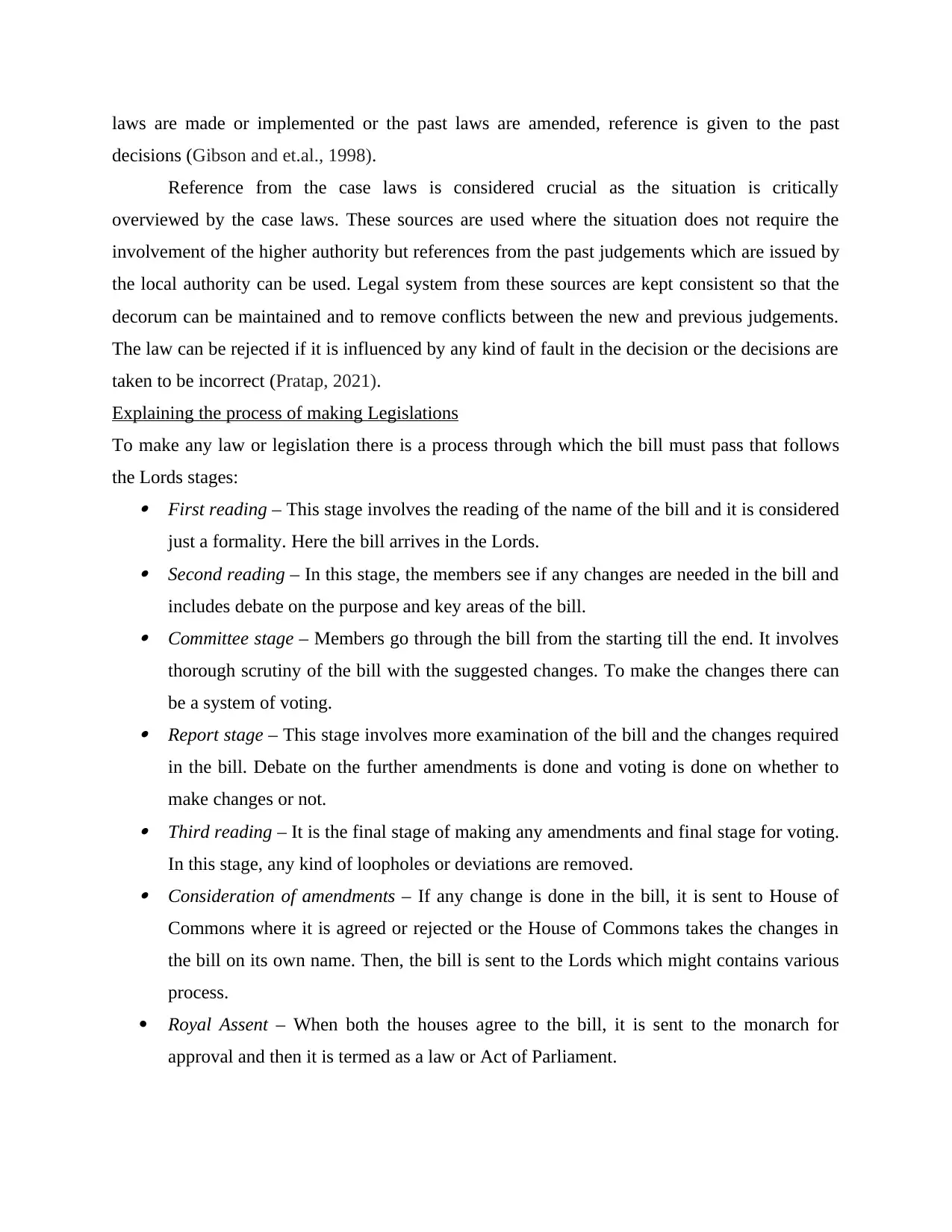
laws are made or implemented or the past laws are amended, reference is given to the past
decisions (Gibson and et.al., 1998).
Reference from the case laws is considered crucial as the situation is critically
overviewed by the case laws. These sources are used where the situation does not require the
involvement of the higher authority but references from the past judgements which are issued by
the local authority can be used. Legal system from these sources are kept consistent so that the
decorum can be maintained and to remove conflicts between the new and previous judgements.
The law can be rejected if it is influenced by any kind of fault in the decision or the decisions are
taken to be incorrect (Pratap, 2021).
Explaining the process of making Legislations
To make any law or legislation there is a process through which the bill must pass that follows
the Lords stages: First reading – This stage involves the reading of the name of the bill and it is considered
just a formality. Here the bill arrives in the Lords. Second reading – In this stage, the members see if any changes are needed in the bill and
includes debate on the purpose and key areas of the bill. Committee stage – Members go through the bill from the starting till the end. It involves
thorough scrutiny of the bill with the suggested changes. To make the changes there can
be a system of voting. Report stage – This stage involves more examination of the bill and the changes required
in the bill. Debate on the further amendments is done and voting is done on whether to
make changes or not. Third reading – It is the final stage of making any amendments and final stage for voting.
In this stage, any kind of loopholes or deviations are removed. Consideration of amendments – If any change is done in the bill, it is sent to House of
Commons where it is agreed or rejected or the House of Commons takes the changes in
the bill on its own name. Then, the bill is sent to the Lords which might contains various
process.
Royal Assent – When both the houses agree to the bill, it is sent to the monarch for
approval and then it is termed as a law or Act of Parliament.
decisions (Gibson and et.al., 1998).
Reference from the case laws is considered crucial as the situation is critically
overviewed by the case laws. These sources are used where the situation does not require the
involvement of the higher authority but references from the past judgements which are issued by
the local authority can be used. Legal system from these sources are kept consistent so that the
decorum can be maintained and to remove conflicts between the new and previous judgements.
The law can be rejected if it is influenced by any kind of fault in the decision or the decisions are
taken to be incorrect (Pratap, 2021).
Explaining the process of making Legislations
To make any law or legislation there is a process through which the bill must pass that follows
the Lords stages: First reading – This stage involves the reading of the name of the bill and it is considered
just a formality. Here the bill arrives in the Lords. Second reading – In this stage, the members see if any changes are needed in the bill and
includes debate on the purpose and key areas of the bill. Committee stage – Members go through the bill from the starting till the end. It involves
thorough scrutiny of the bill with the suggested changes. To make the changes there can
be a system of voting. Report stage – This stage involves more examination of the bill and the changes required
in the bill. Debate on the further amendments is done and voting is done on whether to
make changes or not. Third reading – It is the final stage of making any amendments and final stage for voting.
In this stage, any kind of loopholes or deviations are removed. Consideration of amendments – If any change is done in the bill, it is sent to House of
Commons where it is agreed or rejected or the House of Commons takes the changes in
the bill on its own name. Then, the bill is sent to the Lords which might contains various
process.
Royal Assent – When both the houses agree to the bill, it is sent to the monarch for
approval and then it is termed as a law or Act of Parliament.
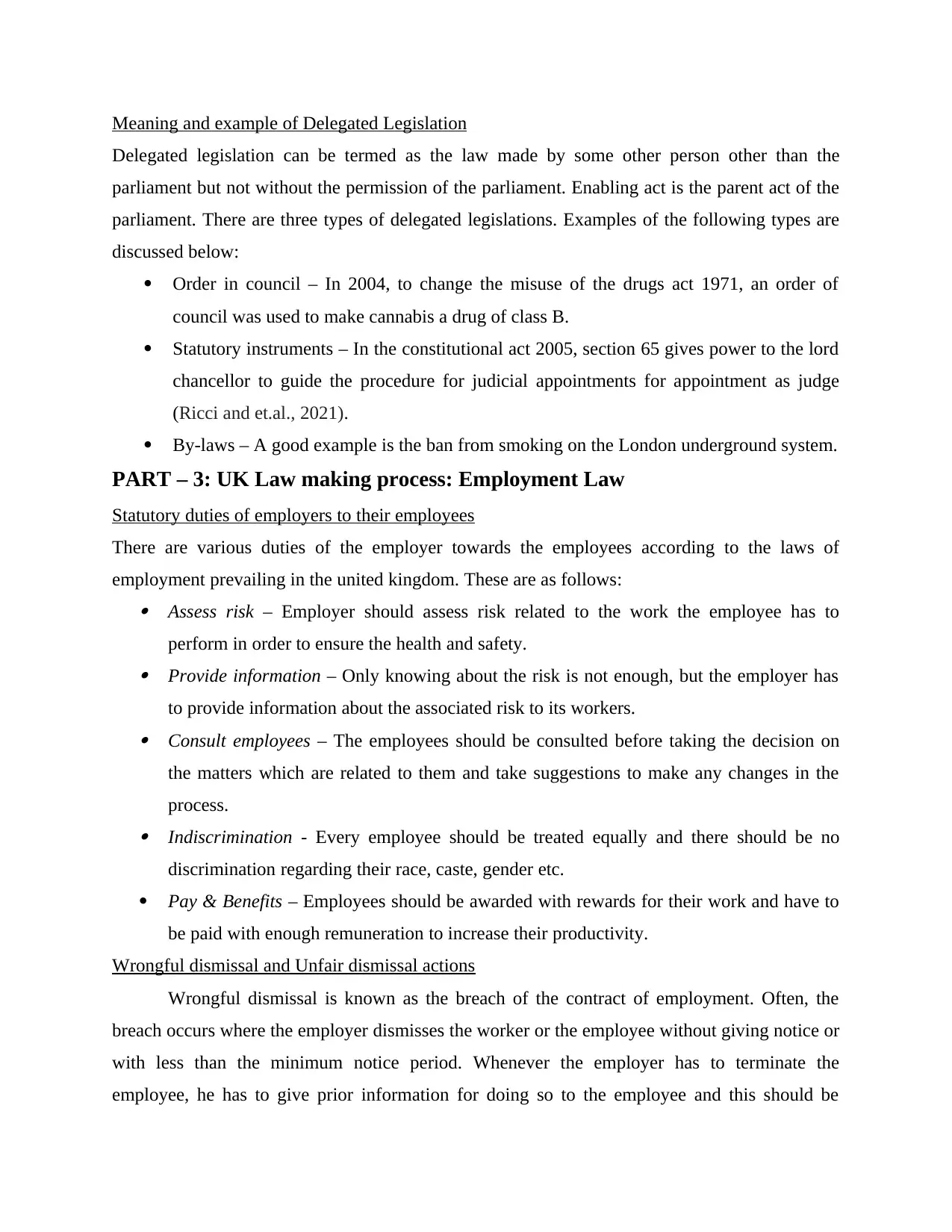
Meaning and example of Delegated Legislation
Delegated legislation can be termed as the law made by some other person other than the
parliament but not without the permission of the parliament. Enabling act is the parent act of the
parliament. There are three types of delegated legislations. Examples of the following types are
discussed below:
Order in council – In 2004, to change the misuse of the drugs act 1971, an order of
council was used to make cannabis a drug of class B.
Statutory instruments – In the constitutional act 2005, section 65 gives power to the lord
chancellor to guide the procedure for judicial appointments for appointment as judge
(Ricci and et.al., 2021).
By-laws – A good example is the ban from smoking on the London underground system.
PART – 3: UK Law making process: Employment Law
Statutory duties of employers to their employees
There are various duties of the employer towards the employees according to the laws of
employment prevailing in the united kingdom. These are as follows: Assess risk – Employer should assess risk related to the work the employee has to
perform in order to ensure the health and safety. Provide information – Only knowing about the risk is not enough, but the employer has
to provide information about the associated risk to its workers. Consult employees – The employees should be consulted before taking the decision on
the matters which are related to them and take suggestions to make any changes in the
process. Indiscrimination - Every employee should be treated equally and there should be no
discrimination regarding their race, caste, gender etc.
Pay & Benefits – Employees should be awarded with rewards for their work and have to
be paid with enough remuneration to increase their productivity.
Wrongful dismissal and Unfair dismissal actions
Wrongful dismissal is known as the breach of the contract of employment. Often, the
breach occurs where the employer dismisses the worker or the employee without giving notice or
with less than the minimum notice period. Whenever the employer has to terminate the
employee, he has to give prior information for doing so to the employee and this should be
Delegated legislation can be termed as the law made by some other person other than the
parliament but not without the permission of the parliament. Enabling act is the parent act of the
parliament. There are three types of delegated legislations. Examples of the following types are
discussed below:
Order in council – In 2004, to change the misuse of the drugs act 1971, an order of
council was used to make cannabis a drug of class B.
Statutory instruments – In the constitutional act 2005, section 65 gives power to the lord
chancellor to guide the procedure for judicial appointments for appointment as judge
(Ricci and et.al., 2021).
By-laws – A good example is the ban from smoking on the London underground system.
PART – 3: UK Law making process: Employment Law
Statutory duties of employers to their employees
There are various duties of the employer towards the employees according to the laws of
employment prevailing in the united kingdom. These are as follows: Assess risk – Employer should assess risk related to the work the employee has to
perform in order to ensure the health and safety. Provide information – Only knowing about the risk is not enough, but the employer has
to provide information about the associated risk to its workers. Consult employees – The employees should be consulted before taking the decision on
the matters which are related to them and take suggestions to make any changes in the
process. Indiscrimination - Every employee should be treated equally and there should be no
discrimination regarding their race, caste, gender etc.
Pay & Benefits – Employees should be awarded with rewards for their work and have to
be paid with enough remuneration to increase their productivity.
Wrongful dismissal and Unfair dismissal actions
Wrongful dismissal is known as the breach of the contract of employment. Often, the
breach occurs where the employer dismisses the worker or the employee without giving notice or
with less than the minimum notice period. Whenever the employer has to terminate the
employee, he has to give prior information for doing so to the employee and this should be
Paraphrase This Document
Need a fresh take? Get an instant paraphrase of this document with our AI Paraphraser
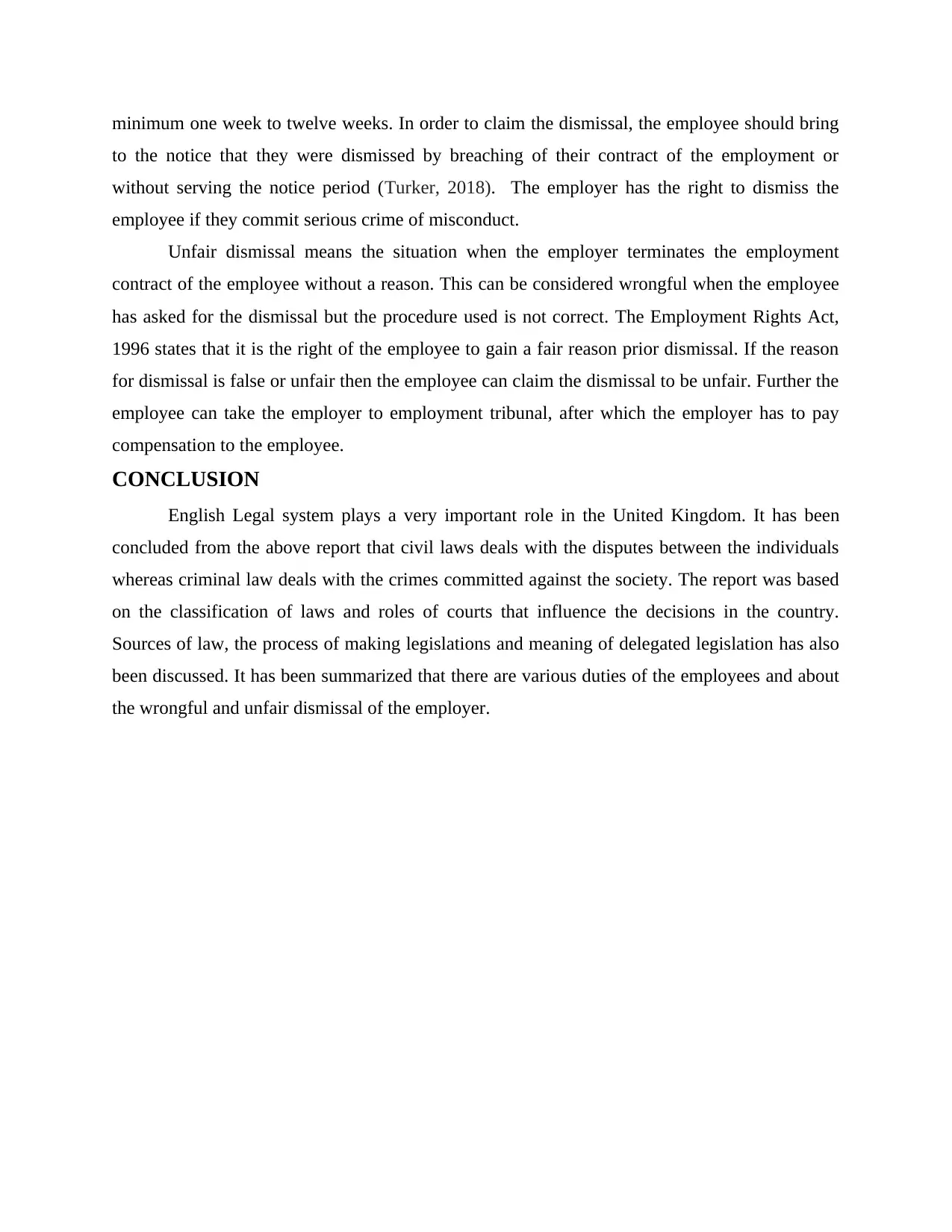
minimum one week to twelve weeks. In order to claim the dismissal, the employee should bring
to the notice that they were dismissed by breaching of their contract of the employment or
without serving the notice period (Turker, 2018). The employer has the right to dismiss the
employee if they commit serious crime of misconduct.
Unfair dismissal means the situation when the employer terminates the employment
contract of the employee without a reason. This can be considered wrongful when the employee
has asked for the dismissal but the procedure used is not correct. The Employment Rights Act,
1996 states that it is the right of the employee to gain a fair reason prior dismissal. If the reason
for dismissal is false or unfair then the employee can claim the dismissal to be unfair. Further the
employee can take the employer to employment tribunal, after which the employer has to pay
compensation to the employee.
CONCLUSION
English Legal system plays a very important role in the United Kingdom. It has been
concluded from the above report that civil laws deals with the disputes between the individuals
whereas criminal law deals with the crimes committed against the society. The report was based
on the classification of laws and roles of courts that influence the decisions in the country.
Sources of law, the process of making legislations and meaning of delegated legislation has also
been discussed. It has been summarized that there are various duties of the employees and about
the wrongful and unfair dismissal of the employer.
to the notice that they were dismissed by breaching of their contract of the employment or
without serving the notice period (Turker, 2018). The employer has the right to dismiss the
employee if they commit serious crime of misconduct.
Unfair dismissal means the situation when the employer terminates the employment
contract of the employee without a reason. This can be considered wrongful when the employee
has asked for the dismissal but the procedure used is not correct. The Employment Rights Act,
1996 states that it is the right of the employee to gain a fair reason prior dismissal. If the reason
for dismissal is false or unfair then the employee can claim the dismissal to be unfair. Further the
employee can take the employer to employment tribunal, after which the employer has to pay
compensation to the employee.
CONCLUSION
English Legal system plays a very important role in the United Kingdom. It has been
concluded from the above report that civil laws deals with the disputes between the individuals
whereas criminal law deals with the crimes committed against the society. The report was based
on the classification of laws and roles of courts that influence the decisions in the country.
Sources of law, the process of making legislations and meaning of delegated legislation has also
been discussed. It has been summarized that there are various duties of the employees and about
the wrongful and unfair dismissal of the employer.
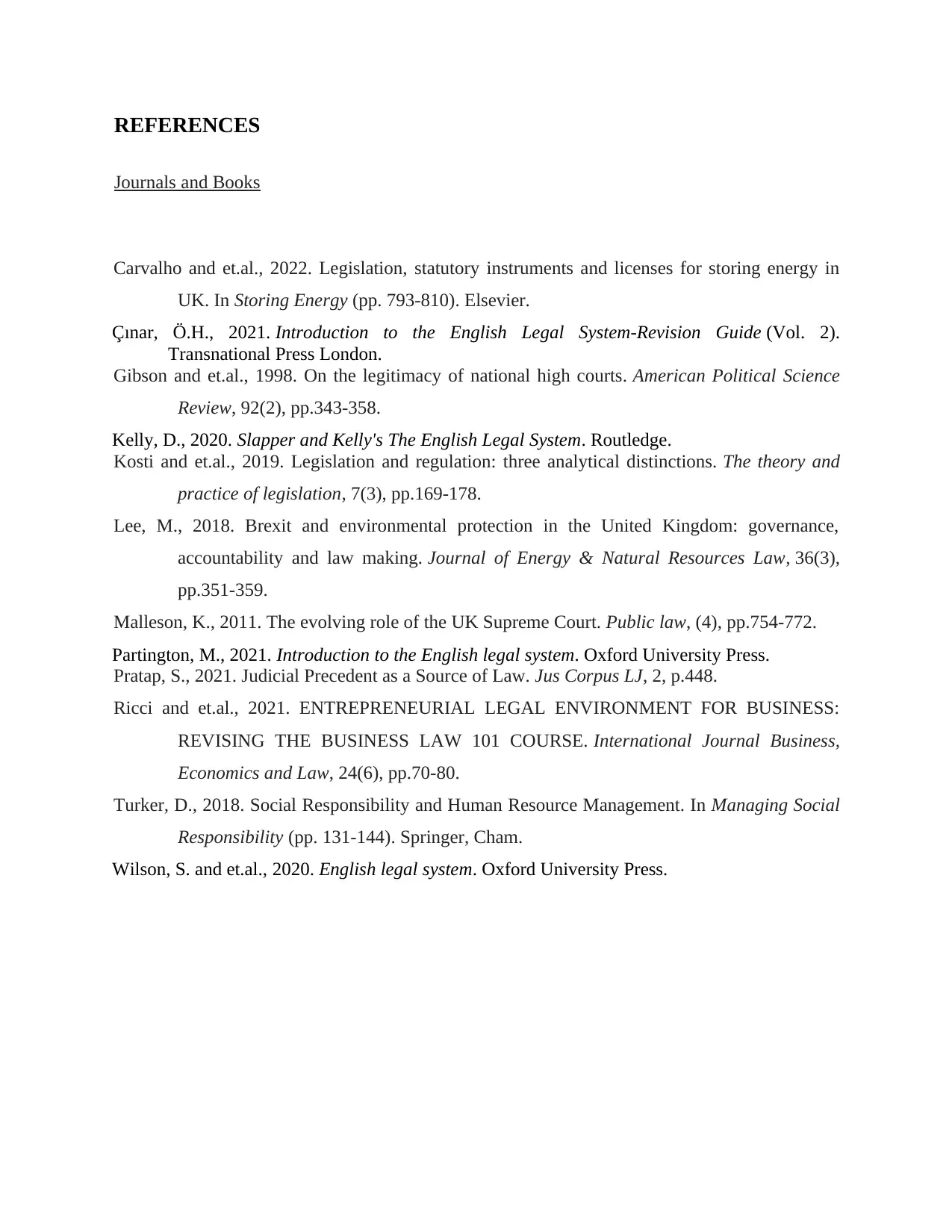
REFERENCES
Journals and Books
Carvalho and et.al., 2022. Legislation, statutory instruments and licenses for storing energy in
UK. In Storing Energy (pp. 793-810). Elsevier.
Çınar, Ö.H., 2021. Introduction to the English Legal System-Revision Guide (Vol. 2).
Transnational Press London.
Gibson and et.al., 1998. On the legitimacy of national high courts. American Political Science
Review, 92(2), pp.343-358.
Kelly, D., 2020. Slapper and Kelly's The English Legal System. Routledge.
Kosti and et.al., 2019. Legislation and regulation: three analytical distinctions. The theory and
practice of legislation, 7(3), pp.169-178.
Lee, M., 2018. Brexit and environmental protection in the United Kingdom: governance,
accountability and law making. Journal of Energy & Natural Resources Law, 36(3),
pp.351-359.
Malleson, K., 2011. The evolving role of the UK Supreme Court. Public law, (4), pp.754-772.
Partington, M., 2021. Introduction to the English legal system. Oxford University Press.
Pratap, S., 2021. Judicial Precedent as a Source of Law. Jus Corpus LJ, 2, p.448.
Ricci and et.al., 2021. ENTREPRENEURIAL LEGAL ENVIRONMENT FOR BUSINESS:
REVISING THE BUSINESS LAW 101 COURSE. International Journal Business,
Economics and Law, 24(6), pp.70-80.
Turker, D., 2018. Social Responsibility and Human Resource Management. In Managing Social
Responsibility (pp. 131-144). Springer, Cham.
Wilson, S. and et.al., 2020. English legal system. Oxford University Press.
Journals and Books
Carvalho and et.al., 2022. Legislation, statutory instruments and licenses for storing energy in
UK. In Storing Energy (pp. 793-810). Elsevier.
Çınar, Ö.H., 2021. Introduction to the English Legal System-Revision Guide (Vol. 2).
Transnational Press London.
Gibson and et.al., 1998. On the legitimacy of national high courts. American Political Science
Review, 92(2), pp.343-358.
Kelly, D., 2020. Slapper and Kelly's The English Legal System. Routledge.
Kosti and et.al., 2019. Legislation and regulation: three analytical distinctions. The theory and
practice of legislation, 7(3), pp.169-178.
Lee, M., 2018. Brexit and environmental protection in the United Kingdom: governance,
accountability and law making. Journal of Energy & Natural Resources Law, 36(3),
pp.351-359.
Malleson, K., 2011. The evolving role of the UK Supreme Court. Public law, (4), pp.754-772.
Partington, M., 2021. Introduction to the English legal system. Oxford University Press.
Pratap, S., 2021. Judicial Precedent as a Source of Law. Jus Corpus LJ, 2, p.448.
Ricci and et.al., 2021. ENTREPRENEURIAL LEGAL ENVIRONMENT FOR BUSINESS:
REVISING THE BUSINESS LAW 101 COURSE. International Journal Business,
Economics and Law, 24(6), pp.70-80.
Turker, D., 2018. Social Responsibility and Human Resource Management. In Managing Social
Responsibility (pp. 131-144). Springer, Cham.
Wilson, S. and et.al., 2020. English legal system. Oxford University Press.

Secure Best Marks with AI Grader
Need help grading? Try our AI Grader for instant feedback on your assignments.

3
1 out of 11
Related Documents
Your All-in-One AI-Powered Toolkit for Academic Success.
+13062052269
info@desklib.com
Available 24*7 on WhatsApp / Email
![[object Object]](/_next/static/media/star-bottom.7253800d.svg)
Unlock your academic potential
© 2024 | Zucol Services PVT LTD | All rights reserved.


